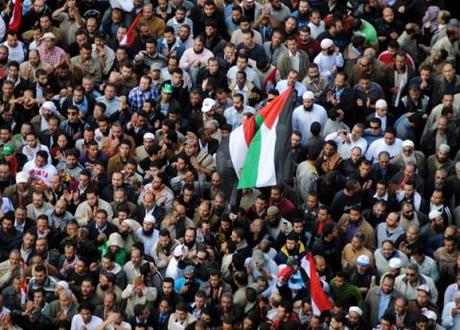
Crowds gather in Tahrir Square, Cairo, Egypt on 18 November 2011. Photo credit: Lilian Wagdy
Egypt is back on the brink. Just nine months ago there were scenes of utter jubilation in Cairo’s Tahrir Square as news spread that pro-democracy demonstrators has succeeded in unseating despised dictator Hosni Mubarak. But it seems Egypt’s revolution is far from finished. In recent days there have been bloody clashes between protesters and the military as demonstrators have taken to the streets to voice their frustration with the governing Supreme Council of the Armed Forces’ (SCAF) seeming refusal to loosen its vice-like grip on power in the post-Mubarak era. SCAF have responded by dishing out heavy beatings, using tear gas and firing rubber bullets. Will the Egyptian people wrestle power from the military junta (which has effectively held power since they overthrew the king in 1952) or will the young revolution be strangled at birth?
The BBC reported that three days of clashes between security forces and protesters have left at least 26 dead and hundreds wounded. The severity of the situation was underlined by the fact that all the country’s civilian cabinet ministers offered their resignations last night.
“This crisis has been brewing for months”, insisted the BBC’s Jeremy Bowen. “It revolves around one central question: Who will have the last word in the new Egypt – the people, via elected politicians, or the generals?”
Political class must step up. Writing at The Guardian’s Comment is Free, Middle East specialist Issandr El Amrani argued that Egypt’s revolution “urgently needs leadership.” He argued that SCAF’s leadership has been “abominable” but also said that “party leaders have not really been shining either. Different political factions don’t really talk to each other, and view each move suspiciously.” The writer called for a national unity government comprised of “strong, respected personalities, backed by political forces” to take “all or most responsibilities” from the SCAF. “The revolution – or a return to social peace and stability – cannot continue (as so many seem to want) without leadership. January 25 may have begun as a diffuse, leaderless protest, but November 19 shows that there are times you need inspirational leadership.”
Public opinion can no longer be disdained. An editorial in The Daily Telegraph said that while the Egyptian regime is basically a “continuation of Mubarak-ism without Mubarak” the mentality of Egyptians has changed: “Emboldened by their successful revolution nine months ago, ordinary Egyptians are no longer prepared to tolerate the behavior of their leaders.” The Telegraph suggested that SCAF, in attempting to give themselves the power to veto the new, post-dictatorship constitution, had gambled on the public’s indifference and “failed in spectacular fashion … By their malign incompetence, the authorities have fanned the flames of popular anger, while failing to reclaim Tahrir Square.” The reoccupation of Tahrir Square should prove to SCAF that “public opinion in post-revolutionary Egypt can no longer be disdained.”
Arab League, US should step in. An Independent editorial suggested that, from day one, an army takeover was always a distinct possibility. The newspaper argued that “the seeds of the present discontent were also sown in those early weeks, in the acceptance – part joyous and part in trepidation – that the military should preside over the transition. When the army took over … the transfer of power was widely hailed as a liberation. But it was a liberation only insofar as the officers who formed the Supreme Council of the Armed Forces accepted that this was a strictly interim arrangement … There was always the risk that the military would rediscover a taste for power, or that a failure to accelerate the development of new institutions and robust electoral procedures would provide a pretext for the army to remain as a bulwark against disorder.” The paper called on the US and the Arab League to step in to persuade the military “that any attempt to prolong their hold on power will make an already perilous situation worse” and to “save the Egyptian revolution.”

